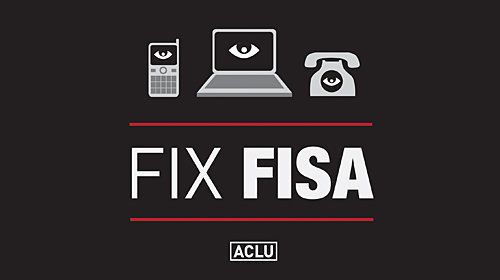
It’s back. On Wednesday the House of Representatives is scheduled to vote on a five-year reauthorization of the FISA Amendments Act (FAA), the 2008 law that legalized the Bush administration’s warrantless wiretapping program and more. It permits the government to get year-long orders from the secret Foreign Intelligence Surveillance Act (FISA) court to conduct dragnet surveillance of Americans’ international communications—including phone calls, emails, and internet records—for the purpose of collecting foreign intelligence. The orders need not specify who is going to be spied on or even allege that the targets did anything wrong. The only guarantees that the FAA gives are that no specific American will be targeted for wiretapping and that some (classified) rules about the use of intercepted information will be followed.
After four years, you’d hope that some basic information or parameters of such a massive spying program would be divulged to the public, or at least your rank-and-file member of Congress, but they haven’t. Only a small handful of members have either personally attended classified briefings or have staff with high enough clearances to attend for them. Sen. Ron Wyden—who has been on the Senate Intelligence Committee for years—has even been stonewalled by the Obama administration for a year and a half in his attempts to learn basic information about the program, such as the number of Americans who have had their communications intercepted under the FAA.
Yet the House ambles on, ready to rubber stamp another five years of expansive surveillance that can pick up American communications without meaningful judicial oversight and without probable cause or any finding of wrongdoing. Instead of blind faith in the executive branch, every member of the House should demand that the administration publicly disclose the following before proceeding with reauthorization:
• Copies of FISA court opinions interpreting our Fourth Amendment rights under the FAA, with redactions to protect sensitive information (the Department of Justice can write summaries of law if necessary);
• A rough estimate of how many Americans are surveilled under the FAA every year;
• A description of the rules that govern how American information picked up by FAA surveillance is protected.
Can you believe that 435 members of Congress who have sworn to uphold the Constitution are about to vote on a sweeping intelligence gathering law without this basic information? Act now to let them know that it’s time for Congress to fix FISA. Keep an eye on this space and the @ACLU on Twitter for updates this week (for more detailed tweets about FISA, follow @Richardson_Mich, A.K.A. Michelle Richardson, the ACLU’s lobbyist who works on FISA).
Relatedly, on October 29th, the Supreme Court will hear arguments in the ACLU’s constitutional challenge to the FAA, which was filed in 2008 less than an hour after President Bush signed the amendments into law.
Learn more about warrantless wiretapping:Sign up for breaking news alerts, follow us on Twitter, and like us on Facebook.


